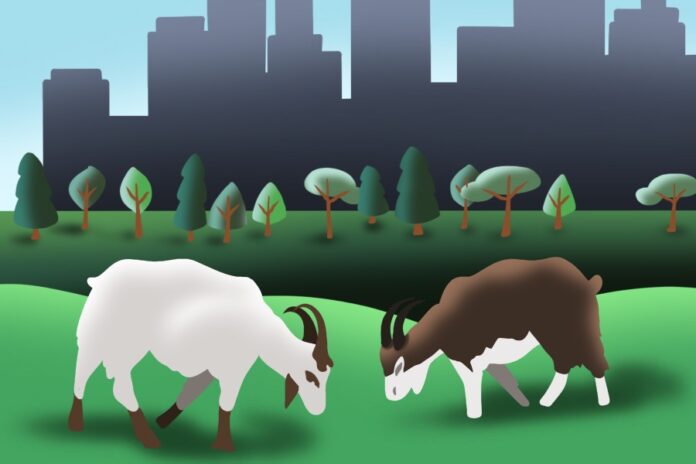“#goatcam” video amasses thousand of views on city’s social media
On April 18, the city of West Sacramento published a video from the perspective of a goat running around near the Sacramento River. A video camera was attached to the head of the goat, and for two minutes, viewers could peer into the life of a goat.
The video featured members of a 400-goat herd chewing shrubs along River Walk Park in West Sacramento. Since then, the video of the goat herd has amassed thousands of views on the city’s Facebook and Twitter pages.
Hiring goats to clear weeds has been a Sacramento tradition since 2014. In 2017, the herd followed a similar trail along the Clarksburg Branch Line Trail. In 2018, the goat herd grazed along the Broderick Boat Camp.
Red Bluff’s Blue Tent Farms hired the goats, and the goats will be chewing through weeds until the end of May. According to a press release from the city of West Sacramento, the goats will be grazing throughout various areas of the city.
“The adorable herd will be in West Sacramento through May hitting hard to reach high growth locations like the banks of the Barge Canal, Clarksburg Branch Line Trail, along the river in front of the Barn, near Tower Bridge and the Broderick Boat Ramp,” the report said.
According to Frank Mitloehner, a UC Davis professor of animal science and air quality specialist, the practice of renting out a goat is both environmentally friendly and fairly common.
“There is no livestock species better suited for brush/fuel control than goats,” Mitloehner said via email. “You can now ‘rent a goat’ and clear the area around your fire-prone house or community. People rent a few dozen and these guys do an amazing job. It has always been the way to do that job and I am glad to see a renaissance of it. Using mowers and burn fossil fuel gas? Why would we do that if we have a natural method?”
According to James Murray, a professor and chair of the UC Davis Animal Sciences department, these natural methods allow access to more hard-to-reach areas. Murray stated using goats has different advantages over sheep and cattle.
“Goats are primarily browsers, and sheep and cattle are grazers, and they all can be very efficient ‘mowers’ of two different types of plants and varying landscapes,” Murray said. “The animals have the capability to access areas that are difficult to reach with mechanical mowers; they can cover areas with a minimal amount of human input and are viewed as a more ‘natural’ means to control vegetation, weeds and reduce fire load.”
According to Dan Macon, a UC Davis farm advisor, a similar grazing method is being used near campus with sheep.
“ANS sheep are currently grazing a restoration site west of campus as a way to support the establishment of native perennial grasses,” Macon said via email.
According to Murray, the university uses sheep and cattle to graze around the Putah Creek area and Russell Ranch.
“The Department of Animal Science occasionally has cattle on both of these areas,” Murray said. “Initially, livestock were excluded to make it a natural area. However, after an invasion of noxious weeds and eventually a fire, Animal Science was asked if we [would] use our animals to graze it again.”
The City of West Sacramento website has a schedule of where the goats are munching on weeds.
“The goal is to reduce the risk of fire danger, and they do a great job,” said city spokesman Paul Hosley to The Sacramento Bee. “And heck, our residents think they’re pretty darn cute.”
Written by: Hannan Waliullah — city@theaggie.org





